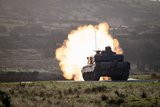UK MoD fails to deliver armoured vehicle capability
The UK Ministry of Defence (MoD) will have an armoured vehicle capability gap until 2025 because it has failed to deliver projects on a consistent basis, according to a new report by the National Audit Office (NAO).
Released on 20 May, the report - The Cost-effective Delivery of an Armoured Vehicle Capability - used the 1998 Strategic Defence Review (SDR) for comparison, and claimed that the MoD’s standard acquisition process for armoured vehicles was not working.
It said that while the MoD had delivered a number of small projects worth £407 million, it had spent £718 million on projects that it had yet to deliver.
Included in the undelivered amounts are projects that have been cancelled or suspended indefinitely, but the report pointed out that this is a relatively small fraction of the £14 billion the MoD intended to spend on the Future Rapid Effect System (FRES) alone.
The FRES project is to be a new family of armoured vehicles designed to deliver a medium-weight capability, ‘and provide the [MoD] with a force more deployable than heavy forces but [that] have greater firepower and protection than light forces’, according to the report.
‘The 1998 Strategic Defence Review assessed that the nature of the threat faced by the United Kingdom had changed from the need to conduct large scale military operations against the Warsaw Pact to prevention of global instability by intervention in trouble spots worldwide,’ the report said.
‘Accordingly, the United Kingdom’s armed forces were to be restructured to improve their ability to deploy, increasing the quantity of medium-weight forces and reducing the numbers of heavy forces.’
However, since 1998 this medium-weight capability has not been delivered. The UK armed forces therefore have had to rely on aged vehicles as they do not have a medium-weight capability while deployed in Afghanistan and Iraq, and have to rely instead on these upgraded, but arguably out-of-date, platforms and soft-skinned vehicles.
Urgent operational requirements (UORs) are deployed to provide enhanced equipment to meet operational demands in theatre as soon as possible. Whereas they are predominately funded by the Treasury Reserve rather than the defence budget, these platforms would not have been necessary if planned projects were delivered in the first place.
The MoD has spent some £2.8 billion since 2003 on upgrading and buying new vehicles through UORs, and while it expects to integrate some of these platforms into its core fleet, there will be significant shortfalls in the equipment capabilities due to the specific nature of the UOR process.
Although funding for UORs does not necessarily come as a blow to the defence budget, the urgency in the delivery of such requirements to the front line means there is less time available to consider other aspects, such as support and ensuring commonality between types, and this means that operating costs can be significantly higher than those from core programmes.
The report warned that if the MoD wishes to be able to operate a broad range of land-based capabilities, an effective, balanced and flexible armoured vehicle capability, comprising heavy, medium and light forces, must remain a priority for defence planners.
More from Land Warfare
-
![US DoD task force’s DroneHunter acquisition lays groundwork for Replicator 2 CUAS strategy]()
US DoD task force’s DroneHunter acquisition lays groundwork for Replicator 2 CUAS strategy
As the US Department of Defense looks to counter the growing threat of uncrewed aerial systems to improve homeland security, the DroneHunter acquisition could point to future commercial innovation.
-
![Norway opts for Hanwha’s Chunmoo for long-range fires under $2 billion deal]()
Norway opts for Hanwha’s Chunmoo for long-range fires under $2 billion deal
The selection of Hanwha’s K239 Chunmoo long-range precision fires system, with a contract expected to be signed on 30 January, makes Norway the second European country to choose the system. It is expected an operational system will be in service within four years.
-
![Layered protection: How air defence is adapting to rising drone and missile threats (podcast)]()
Layered protection: How air defence is adapting to rising drone and missile threats (podcast)
A surge in aerial threats – from advanced missiles to low-cost drones – is reshaping the way militaries approach air defence, driving demand for flexible, multi-layered solutions.























